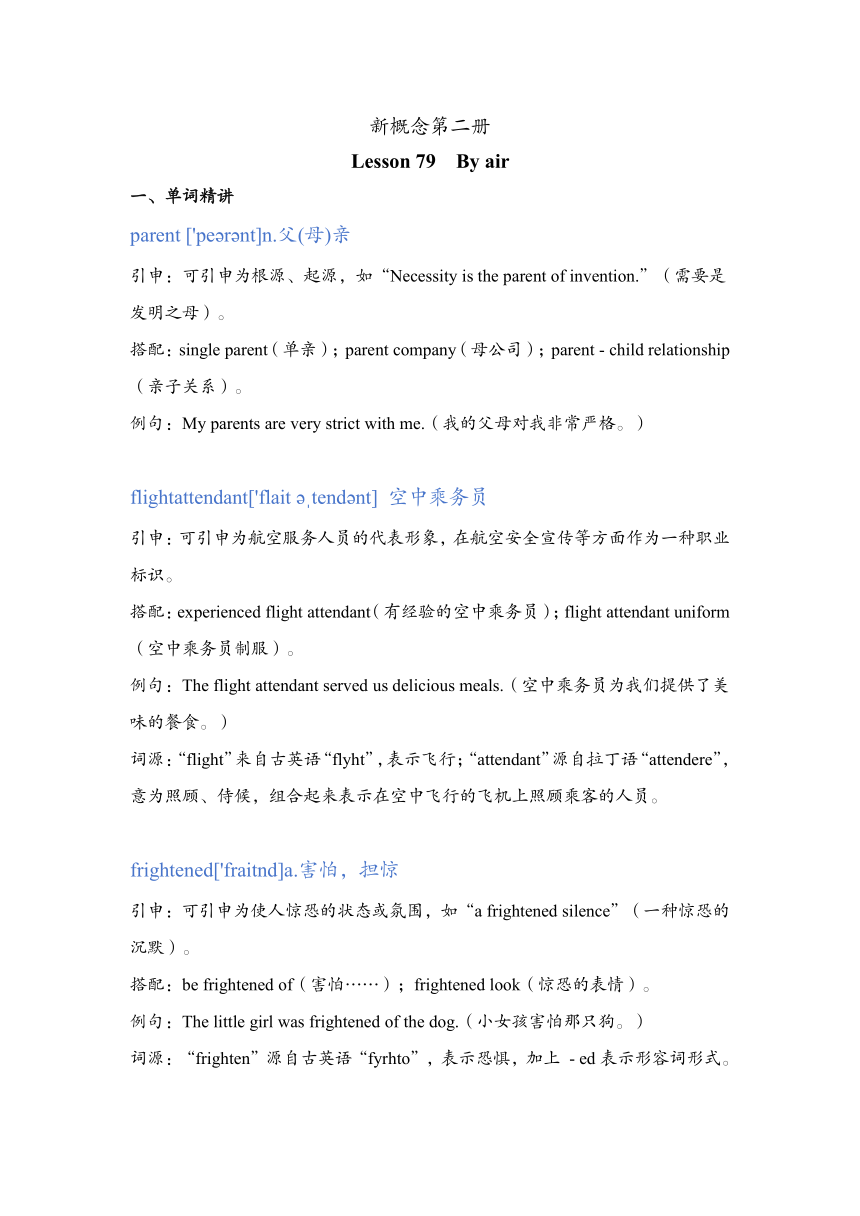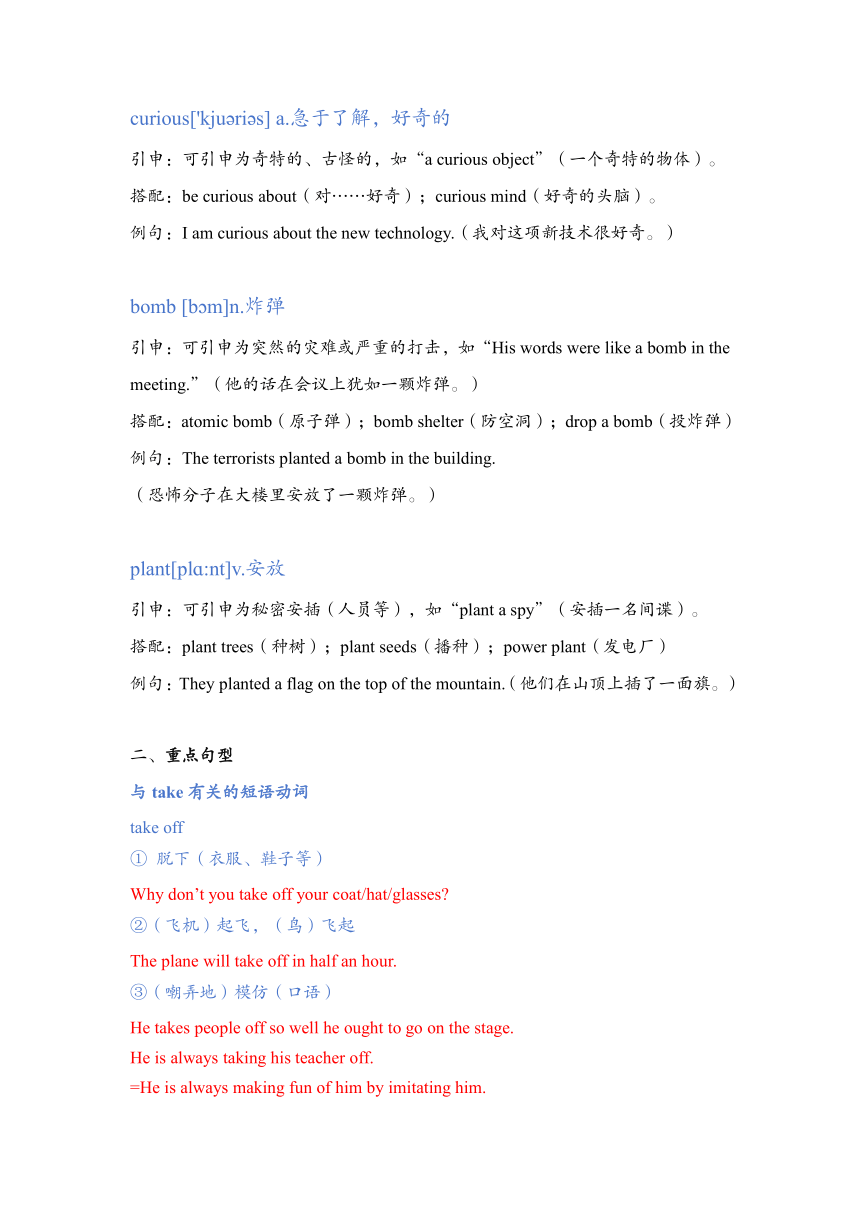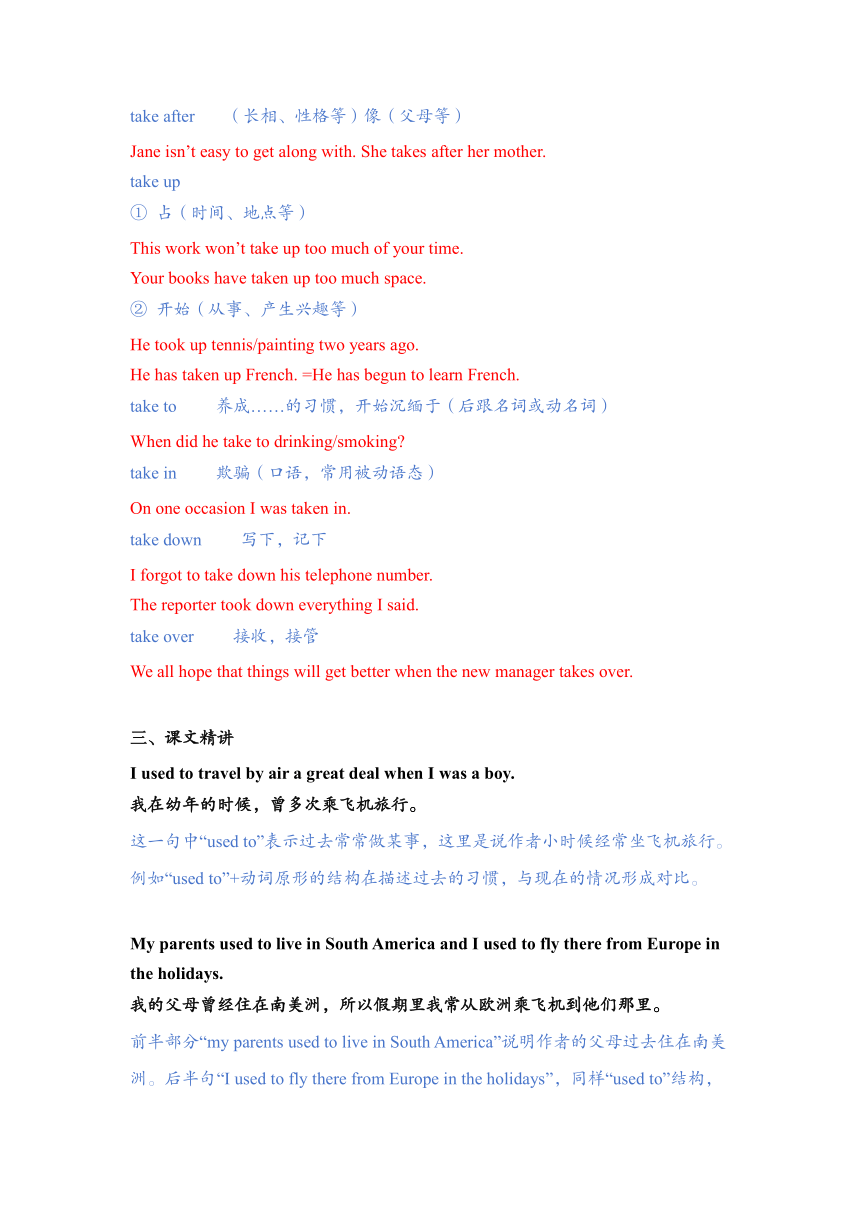新概念第二册Lesson 79 By air讲义
文档属性
| 名称 | 新概念第二册Lesson 79 By air讲义 |  | |
| 格式 | docx | ||
| 文件大小 | 106.9KB | ||
| 资源类型 | 教案 | ||
| 版本资源 | 新概念英语 | ||
| 科目 | 英语 | ||
| 更新时间 | 2024-11-25 14:33:56 | ||
图片预览



文档简介
新概念第二册
Lesson 79 By air
单词精讲
parent ['pe r nt]n.父(母)亲
引申:可引申为根源、起源,如“Necessity is the parent of invention.”(需要是发明之母)。
搭配:single parent(单亲);parent company(母公司);parent - child relationship(亲子关系)。
例句:My parents are very strict with me.(我的父母对我非常严格。)
flightattendant['flait tend nt] 空中乘务员
引申:可引申为航空服务人员的代表形象,在航空安全宣传等方面作为一种职业标识。
搭配:experienced flight attendant(有经验的空中乘务员);flight attendant uniform(空中乘务员制服)。
例句:The flight attendant served us delicious meals.(空中乘务员为我们提供了美味的餐食。)
词源:“flight”来自古英语“flyht”,表示飞行;“attendant”源自拉丁语“attendere”,意为照顾、侍候,组合起来表示在空中飞行的飞机上照顾乘客的人员。
frightened['fraitnd]a.害怕,担惊
引申:可引申为使人惊恐的状态或氛围,如“a frightened silence”(一种惊恐的沉默)。
搭配:be frightened of(害怕……);frightened look(惊恐的表情)。
例句:The little girl was frightened of the dog.(小女孩害怕那只狗。)
词源:“frighten”源自古英语“fyrhto”,表示恐惧,加上 - ed表示形容词形式。
curious['kju ri s] a.急于了解,好奇的
引申:可引申为奇特的、古怪的,如“a curious object”(一个奇特的物体)。
搭配:be curious about(对……好奇);curious mind(好奇的头脑)。
例句:I am curious about the new technology.(我对这项新技术很好奇。)
bomb [b m]n.炸弹
引申:可引申为突然的灾难或严重的打击,如“His words were like a bomb in the meeting.”(他的话在会议上犹如一颗炸弹。)
搭配:atomic bomb(原子弹);bomb shelter(防空洞);drop a bomb(投炸弹)
例句:The terrorists planted a bomb in the building.
(恐怖分子在大楼里安放了一颗炸弹。)
plant[plɑ:nt]v.安放
引申:可引申为秘密安插(人员等),如“plant a spy”(安插一名间谍)。
搭配:plant trees(种树);plant seeds(播种);power plant(发电厂)
例句:They planted a flag on the top of the mountain.(他们在山顶上插了一面旗。)
重点句型
与take有关的短语动词
take off
① 脱下(衣服、鞋子等)
Why don’t you take off your coat/hat/glasses
②(飞机)起飞,(鸟)飞起
The plane will take off in half an hour.
③(嘲弄地)模仿(口语)
He takes people off so well he ought to go on the stage.
He is always taking his teacher off.
=He is always making fun of him by imitating him.
take after (长相、性格等)像(父母等)
Jane isn’t easy to get along with. She takes after her mother.
take up
① 占(时间、地点等)
This work won’t take up too much of your time.
Your books have taken up too much space.
② 开始(从事、产生兴趣等)
He took up tennis/painting two years ago.
He has taken up French. =He has begun to learn French.
take to 养成……的习惯,开始沉缅于(后跟名词或动名词)
When did he take to drinking/smoking
take in 欺骗(口语,常用被动语态)
On one occasion I was taken in.
take down 写下,记下
I forgot to take down his telephone number.
The reporter took down everything I said.
take over 接收,接管
We all hope that things will get better when the new manager takes over.
课文精讲
I used to travel by air a great deal when I was a boy.
我在幼年的时候,曾多次乘飞机旅行。
这一句中“used to”表示过去常常做某事,这里是说作者小时候经常坐飞机旅行。例如“used to”+动词原形的结构在描述过去的习惯,与现在的情况形成对比。
My parents used to live in South America and I used to fly there from Europe in the holidays.
我的父母曾经住在南美洲,所以假期里我常从欧洲乘飞机到他们那里。
前半部分“my parents used to live in South America”说明作者的父母过去住在南美洲。后半句“I used to fly there from Europe in the holidays”,同样“used to”结构,表示过去在假期作者常常从欧洲飞到南美洲去。这里描绘了作者家庭的居住情况以及他过去的出行模式。
A flight attendant would take charge of me and I never had an unpleasant experience.我总是由一位空中乘务员照管,从未遇到过不愉快的经历。
take charge (of)… 照顾……,接管,开始管理
She took charge of the child after his parents died.
The new manager will take charge (of the company) from next week.
I am used to travelling by air and only on one occasion have I ever felt frightened. 我习惯了乘飞机旅行,只是有一次把我吓坏了。
倒装句,倒装句的结构为“副词+助动词(be,do,have,can,must等)+主语 +句子的其余部分”。
用倒装句的情况:
① 句首为否定或近似否定的副词(never,rarely,little,on no occasion,hardly,no sooner…that等):
Little does he realize how important this meeting is.
Never has he got so many letters.
On no occasion must you accept any money if he offers it.
② 句首为only构成的词组(如only after,only then等):
Only then did I realize what a mistake I have made.
Only after she had taken off her coat and hat could I recognize her.
如果only 加上一个状语放在句首,那么就要用倒装语序。即把肯定句语序变成一般疑问句语序。
It is only in recent years that it gained bad reputation. 强调句型
Only in recent years did the tree gain bad reputation. 倒装句也表示强调
be used to doing sth. 习惯于做某事
After taking off, we were flying low over the city and slowly gaining height, when the plane suddenly turned round and flew back to the airport.
起飞之后,我们在城市上空低低地飞行,然后慢慢爬高。
take off 起飞
gain height (飞机)增加高度,爬高 (gain vt. 增加)
The car gained speed when it was outside the town.
He has gained so much weight that he decides to go on a diet.
touch down (飞机)着陆,降落
Don’t stand up before the plane has touched down.
While we were waiting to land, a flight attendant told us to keep calm and to get off the plane quietly as soon as it had touched down.
在我们等待降落时,一位空中乘务员告诉我们要保持镇静,待飞机一着陆,就马上不声不响地离开飞机。
“while we were waiting to land”表示当我们正在等待降落的时候。“a flight attendant told us to keep calm and to get off the plane quietly as soon as it had touched down”,空乘人员告诉乘客要保持冷静,并且飞机一降落就安静地下飞机,这里体现了在特殊情况下空乘人员对乘客的引导。
Everybody on board was worried and we were curious to find out what had happened.飞机上的人都很着急,大家都急于想知道究竟出了什么事。
on board 在……(如飞机)上,搭乘(船、飞机、火车、汽车等)
Tom has never been on board a plane before.
Later we learnt that there was a very important person on board.
后来我们才得知,飞机上坐了一位非常重要的人物。
这里“learnt”是“learn”的过去式,表示得知。句子的意思是后来我们得知飞机上有一个非常重要的人物,这是对飞机突然返回机场原因的一个初步揭示。
The police had been told that a bomb had been planted on the plane.
“had been told”是过去完成时的被动语态,表示警察被告知。“a bomb had been planted on the plane”是被告知的内容,即飞机上被放置了炸弹,这进一步解释了飞机返回机场的严重原因。
After we had landed, the plane was searched thoroughly.
有人报告警察,说飞机上安放了一枚炸弹。我们降落之后,飞机被彻底搜查了一遍。
“after we had landed”是一个时间状语从句,使用过去完成时表示在我们已经降落之后。“the plane was searched thoroughly”是说飞机被彻底搜查,这是应对炸弹威胁的合理措施。
Fortunately, nothing was found and five hours later we were able to take off again.幸运的是,什么也没有找到。5个小时后,我们又起飞了。
“fortunately”表示幸运的是。“nothing was found”表示没有发现任何东西。“five hours later we were able to take off again”说明五个小时之后我们又能够起飞了,这是事情的最终结果,从紧张的炸弹危机又回归到正常的飞行状态。
Lesson 79 By air
单词精讲
parent ['pe r nt]n.父(母)亲
引申:可引申为根源、起源,如“Necessity is the parent of invention.”(需要是发明之母)。
搭配:single parent(单亲);parent company(母公司);parent - child relationship(亲子关系)。
例句:My parents are very strict with me.(我的父母对我非常严格。)
flightattendant['flait tend nt] 空中乘务员
引申:可引申为航空服务人员的代表形象,在航空安全宣传等方面作为一种职业标识。
搭配:experienced flight attendant(有经验的空中乘务员);flight attendant uniform(空中乘务员制服)。
例句:The flight attendant served us delicious meals.(空中乘务员为我们提供了美味的餐食。)
词源:“flight”来自古英语“flyht”,表示飞行;“attendant”源自拉丁语“attendere”,意为照顾、侍候,组合起来表示在空中飞行的飞机上照顾乘客的人员。
frightened['fraitnd]a.害怕,担惊
引申:可引申为使人惊恐的状态或氛围,如“a frightened silence”(一种惊恐的沉默)。
搭配:be frightened of(害怕……);frightened look(惊恐的表情)。
例句:The little girl was frightened of the dog.(小女孩害怕那只狗。)
词源:“frighten”源自古英语“fyrhto”,表示恐惧,加上 - ed表示形容词形式。
curious['kju ri s] a.急于了解,好奇的
引申:可引申为奇特的、古怪的,如“a curious object”(一个奇特的物体)。
搭配:be curious about(对……好奇);curious mind(好奇的头脑)。
例句:I am curious about the new technology.(我对这项新技术很好奇。)
bomb [b m]n.炸弹
引申:可引申为突然的灾难或严重的打击,如“His words were like a bomb in the meeting.”(他的话在会议上犹如一颗炸弹。)
搭配:atomic bomb(原子弹);bomb shelter(防空洞);drop a bomb(投炸弹)
例句:The terrorists planted a bomb in the building.
(恐怖分子在大楼里安放了一颗炸弹。)
plant[plɑ:nt]v.安放
引申:可引申为秘密安插(人员等),如“plant a spy”(安插一名间谍)。
搭配:plant trees(种树);plant seeds(播种);power plant(发电厂)
例句:They planted a flag on the top of the mountain.(他们在山顶上插了一面旗。)
重点句型
与take有关的短语动词
take off
① 脱下(衣服、鞋子等)
Why don’t you take off your coat/hat/glasses
②(飞机)起飞,(鸟)飞起
The plane will take off in half an hour.
③(嘲弄地)模仿(口语)
He takes people off so well he ought to go on the stage.
He is always taking his teacher off.
=He is always making fun of him by imitating him.
take after (长相、性格等)像(父母等)
Jane isn’t easy to get along with. She takes after her mother.
take up
① 占(时间、地点等)
This work won’t take up too much of your time.
Your books have taken up too much space.
② 开始(从事、产生兴趣等)
He took up tennis/painting two years ago.
He has taken up French. =He has begun to learn French.
take to 养成……的习惯,开始沉缅于(后跟名词或动名词)
When did he take to drinking/smoking
take in 欺骗(口语,常用被动语态)
On one occasion I was taken in.
take down 写下,记下
I forgot to take down his telephone number.
The reporter took down everything I said.
take over 接收,接管
We all hope that things will get better when the new manager takes over.
课文精讲
I used to travel by air a great deal when I was a boy.
我在幼年的时候,曾多次乘飞机旅行。
这一句中“used to”表示过去常常做某事,这里是说作者小时候经常坐飞机旅行。例如“used to”+动词原形的结构在描述过去的习惯,与现在的情况形成对比。
My parents used to live in South America and I used to fly there from Europe in the holidays.
我的父母曾经住在南美洲,所以假期里我常从欧洲乘飞机到他们那里。
前半部分“my parents used to live in South America”说明作者的父母过去住在南美洲。后半句“I used to fly there from Europe in the holidays”,同样“used to”结构,表示过去在假期作者常常从欧洲飞到南美洲去。这里描绘了作者家庭的居住情况以及他过去的出行模式。
A flight attendant would take charge of me and I never had an unpleasant experience.我总是由一位空中乘务员照管,从未遇到过不愉快的经历。
take charge (of)… 照顾……,接管,开始管理
She took charge of the child after his parents died.
The new manager will take charge (of the company) from next week.
I am used to travelling by air and only on one occasion have I ever felt frightened. 我习惯了乘飞机旅行,只是有一次把我吓坏了。
倒装句,倒装句的结构为“副词+助动词(be,do,have,can,must等)+主语 +句子的其余部分”。
用倒装句的情况:
① 句首为否定或近似否定的副词(never,rarely,little,on no occasion,hardly,no sooner…that等):
Little does he realize how important this meeting is.
Never has he got so many letters.
On no occasion must you accept any money if he offers it.
② 句首为only构成的词组(如only after,only then等):
Only then did I realize what a mistake I have made.
Only after she had taken off her coat and hat could I recognize her.
如果only 加上一个状语放在句首,那么就要用倒装语序。即把肯定句语序变成一般疑问句语序。
It is only in recent years that it gained bad reputation. 强调句型
Only in recent years did the tree gain bad reputation. 倒装句也表示强调
be used to doing sth. 习惯于做某事
After taking off, we were flying low over the city and slowly gaining height, when the plane suddenly turned round and flew back to the airport.
起飞之后,我们在城市上空低低地飞行,然后慢慢爬高。
take off 起飞
gain height (飞机)增加高度,爬高 (gain vt. 增加)
The car gained speed when it was outside the town.
He has gained so much weight that he decides to go on a diet.
touch down (飞机)着陆,降落
Don’t stand up before the plane has touched down.
While we were waiting to land, a flight attendant told us to keep calm and to get off the plane quietly as soon as it had touched down.
在我们等待降落时,一位空中乘务员告诉我们要保持镇静,待飞机一着陆,就马上不声不响地离开飞机。
“while we were waiting to land”表示当我们正在等待降落的时候。“a flight attendant told us to keep calm and to get off the plane quietly as soon as it had touched down”,空乘人员告诉乘客要保持冷静,并且飞机一降落就安静地下飞机,这里体现了在特殊情况下空乘人员对乘客的引导。
Everybody on board was worried and we were curious to find out what had happened.飞机上的人都很着急,大家都急于想知道究竟出了什么事。
on board 在……(如飞机)上,搭乘(船、飞机、火车、汽车等)
Tom has never been on board a plane before.
Later we learnt that there was a very important person on board.
后来我们才得知,飞机上坐了一位非常重要的人物。
这里“learnt”是“learn”的过去式,表示得知。句子的意思是后来我们得知飞机上有一个非常重要的人物,这是对飞机突然返回机场原因的一个初步揭示。
The police had been told that a bomb had been planted on the plane.
“had been told”是过去完成时的被动语态,表示警察被告知。“a bomb had been planted on the plane”是被告知的内容,即飞机上被放置了炸弹,这进一步解释了飞机返回机场的严重原因。
After we had landed, the plane was searched thoroughly.
有人报告警察,说飞机上安放了一枚炸弹。我们降落之后,飞机被彻底搜查了一遍。
“after we had landed”是一个时间状语从句,使用过去完成时表示在我们已经降落之后。“the plane was searched thoroughly”是说飞机被彻底搜查,这是应对炸弹威胁的合理措施。
Fortunately, nothing was found and five hours later we were able to take off again.幸运的是,什么也没有找到。5个小时后,我们又起飞了。
“fortunately”表示幸运的是。“nothing was found”表示没有发现任何东西。“five hours later we were able to take off again”说明五个小时之后我们又能够起飞了,这是事情的最终结果,从紧张的炸弹危机又回归到正常的飞行状态。
同课章节目录
